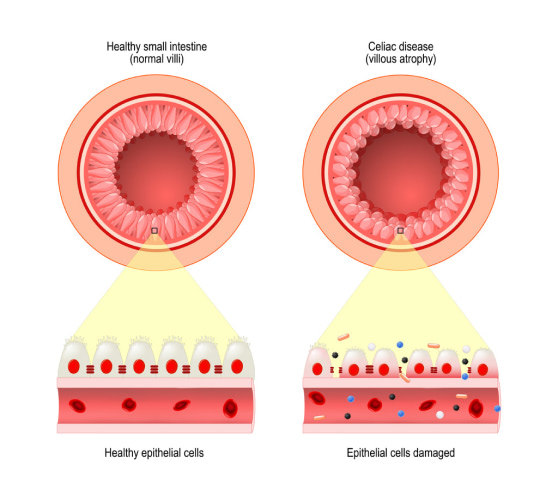There is a lot of talk about gluten-free diets these days. Some people see it as a fad, but others know it is crucial to keep the symptoms of celiac disease in check. Celiac disease is a genetic autoimmune disease that affects millions of people worldwide. When people with celiac disease eat gluten, their bodies attack healthy tissue in the small intestines and flatten villi, which are the projections in the body that absorb nutrients from food. Some find that avoiding food containing gluten can be tough since it is found in products containing wheat, barley, and rye. This restrictive diet is currently the only known way to manage the disease, which is not treatable at this time.
What are the Symptoms of Celiac Disease in Children?
Celiac onset can come at any age, and symptoms can vary based on the person and age. It can be challenging to diagnose children, especially since only 20-30% of kids with the disease show typical stomach symptoms. Common symptoms include decreased appetite, irritability, failure to thrive, and a swollen belly. Other common symptoms include anemia, bloating and gas, chronic diarrhea or constipation, fatigue, vomiting, and poor weight gain. Roughly 75% of children with celiac disease are overweight at diagnosis.
Although a gluten-free diet is crucial to keep symptoms under control, a new study is showing that nearly 20% of children continue to have intestinal abnormalities. The study followed the health records of 103 children and adolescents with Celiac who had followed a gluten-free diet for an average of 2.4 years, with 90% of them having an excellent adherence to their diet. The children underwent intestinal endoscopies and biopsies at least twice – at diagnosis and after at least one year on the diet. When tested a second time, 19% of the children showed enteropathy, the gluten-induced damage to intestinal cells, despite sticking to the gluten-free diet.

Are There Long-Term Effects for Children with Celiac Disease?
Currently, the long-term effects of this aren’t known, but the study leaders indicate that it could lead to future complications and suboptimal growth. It does indicate a need to have symptoms and diet monitored by your doctor and come up with a plan to maintain the symptoms of the disease.
Bring Your Child to the Pediatric Specialist in Jackson, MS
Give your child a chance at a happy tummy. The pediatric specialists at GI Associates are specifically trained to help children with gastrointestinal disorders. We have dedicated nurses and staff members to make the pediatric patient and family feel more at ease. Request an appointment today.
